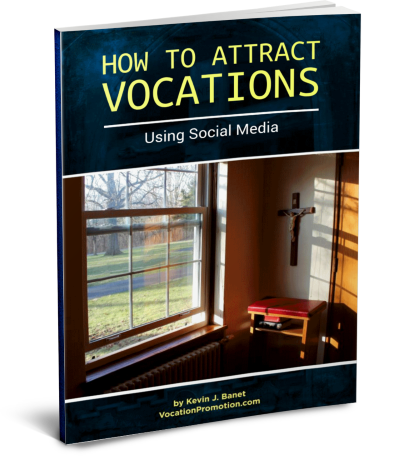
Don't you think St. Paul would have used one of these?
I have a great respect for Homiletic & Pastoral Review. It is an excellent journal that helps priests and Church ministers in their pastoral work. However, in the current issue, I was taken aback by Fr. Damian J. Ference’s article, “Why Vocations Programs Won’t Work.”
Fr. Damian, a diocesan priest from Cleveland, OH, claims that prayer cards and posters don’t attract vocations – real people do. And the root of the problem is a lack of discipleship among the faithful, not fancy promotion programs. Well said, Father. I have worked with many religious communities in my job of promoting vocations on the internet, and vocation directors decry the difficulty in finding good candidates.
While sophisticated media programs, such as videos, websites, and a social media presence, is not the complete answer, you can’t discount the need for getting involved in what Vatican Council II called “the modern means of communication.” After all, St. Paul used a pen and parchment of some kind, and depended on a system of delivering his letters to various places in the Mediterranean. Just as he used the technology of his day, so must we use our electronic technology.
And yet, spending even a million dollars with a Madison Avenue PR firm won’t guarantee vocations. We need to get back to the basics. Fr. Damian touched on the need for fundamentals in living the Christian life. But what can religious communities do? From my experience, candidates need to see a community that knows what they are about, and who live it. (Read our article, “Cardinal Arinze on vocations: know who you are.”
Many years ago, I knew a woman who was getting ready to visit a religious community for the possibility of entering it. She surprised me by explaining that they took time to explain the life of the foundress. What good is that? I thought, in my ignorant youth. The founder’s life was a long time ago, and such history seemed irrelevant to me at the time.
But, like every good basketball coach knows, you must go back to the fundamentals. Like going over dribbling, passing and jump shots, a community must ask itself, what were the motivations and goals of their founder, and what is the charism of the order? How should the community live out its vows of poverty, chastity and obedience?
When religious orders and congregations go to Rome, the Holy Father always commends them on following their founder’s inspirations. (Of course, to some degree this is comment is charitable, since no community is perfect, and some rather flawed.) The Holy Father is hinting that the fundamentals are important.
Prayer cards and posters – and I might add websites and blog posts – are not gimmicks. Communities need these, but they must also ensure a foundation of authentic community life.
